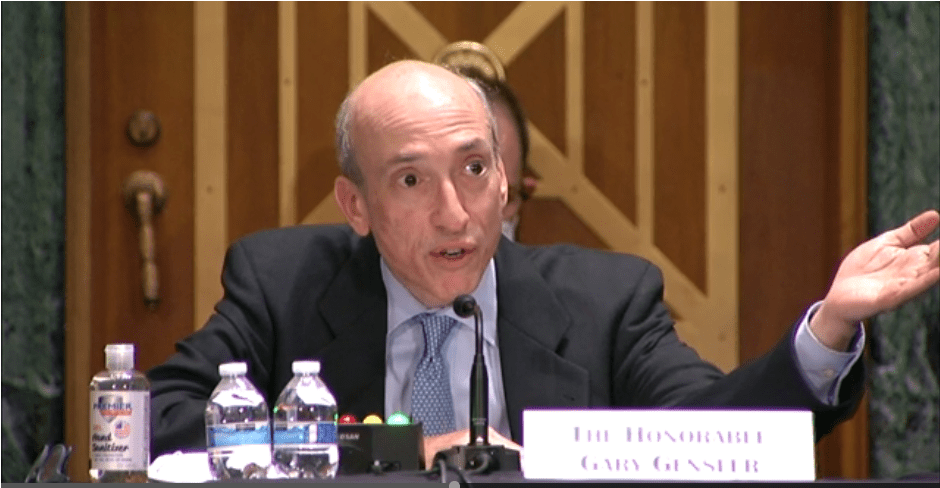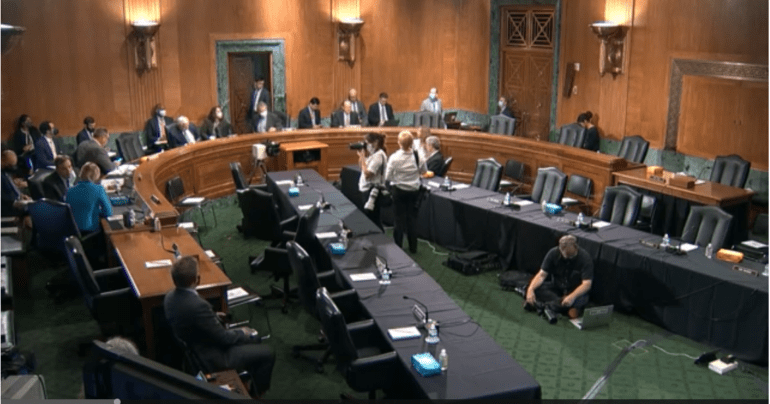Tuesday morning, the Senate Banking Committee held an oversight with the Securities Exchange Commission’s Chairman Gary Gensler.
A bipartisan group of senators questioned Gensler’s regulatory intentions on topics from cryptocurrency to retail investing.
Gensler began by speaking with board Chairman Sen. Sherrod Brown (D-OH), reporting his staff was researching the dangers of SPACS.
But as ranking member Sen. Pat Toomey (R- PA) took the talking stick, he went right into Payment for Order Flow (PFOF).
“I worry you would favor the paternalistic push by some on the left to restrict investor freedom under the guise of protection while actually harming retail investors; such harm may result in the form of your opposition to Payment for Order Flow,” Toomey said.
“Banning Payment for Order Flow could very well have the effect of eliminating commission-free investing, which would be a great disservice to average investors.”
Toomey’s point comes from the idea that PFOF has enabled the best time ever to be a retail investor in America.
Through commission-free trading, no minimum balances, low or no-fee mutual funds ETFs, and user-friendly tech-like mobile apps, Toomey said investors could take part in the profits of Wall Street like never before.

Payment for order flow
Gensler said his biggest worry about the equity market was competition and consolidation. While retail investing has taken off, the PFOF that enables it is ripe for conflict of interest: he said more than half of all PFOF trades go into one big pool.
“Nearly half of the volume transacted is executed in “dark pools” or by wholesalers. I wonder whether this means that the consolidated tape — the so-called National Best Bid and Offer — fully reflects the full range of activity on exchanges,” Gensler said in testimony.
“As I have stated previously, I believe payment for order flow and exchange rebates may present a number of conflicts of interest.”
Retail investors have flocked to products like Robinhood, which offers fee-less and fractional investing in stocks, and securities, by selling their customer’s trades to partner market makers instead of “actually” posting them on the true securities markets.
The practice, pioneered by Bernie Madoff, printed $2.5 billion in 2020 for top trading firms like T.D. Ameritrade, Robinhood, and Charles Schwab.
Feeless trading would disappear
The majority of fees collected come from options trades in small amounts of $.50 at a time. Without it, Toomey and others argue feeless trading would disappear overnight, and so would retail investing.
In March, PFOF became a retail investor rallying cry when Robinhood shut down trading of Gamestop to cover a change in its own market maker deposit requirements.
To some, it looked like PFOF had enabled hedge funds to shut down orders that were losing them money by requiring Robinhood to foot the bill. But, ironically, PFOF is the only reason retail investors got into Gamestop in the first place.
SenatorJack Reed (D-RI) went into PFOF, asking Gensler, “is the owner of these securities getting the best deal?”
“I think it may make our markets less efficient; retail traders may not be getting the best execution even if with a price improvement [feeless trading,]” Gensler said.
“If anyone on this Commission or this staff makes a trade on these platforms, it is 97 per cent chance that it does not go to an exchange; it goes to dark markets and secondary sale.”
As Gensler later went on to tell Senator Tim Scott (R-SC): the goal is to encourage more competition in the investing order market, not less. In addition, he hopes to find a way to shorten the settlement cycle, to leave traders less exposed.
“Technology has driven down the cost of investing, but there’s still a cost left PFOF, even a couple of pennies out there is still a cost,” Gensler said.
“What I have raised with Jennifer Leete: we can we do better with more competition, rather than one reseller buying half the orders in America. I think we will try to drive it down to an even lower cost.”
Leete was appointed as Associate Director in Enforcement in the SEC in 2020, with 20 years of experience supervising cases against convicted trading order fraudsters at the SEC.
Cryptocurrency security regulation
As Toomey first brought up and jumped into during his question period, Gensler has recently made it clear he believed some cryptocurrency products were securities and needed to be regulated. The senator said he would like to see more public guidance.
“So I’m frustrated by the lack of helpful SEC public guidance, explaining how you make this distinction: What makes some of them securities while others are not,” Toomey said. “Why not publicly announce what characteristics make the cryptocurrency?”
Toomey referred to stable coins, crypto-assets founded with the goal of stability to govern exchanges and offer liquidity as non-securities. However, if they don’t have an “expectation of profit on the investment,” they don’t beat the Howey test for securities, and in Toomey’s book, they are not securities.
“As Thurgood Marshall wrote in the Reves opinion, in defining the scope of the market that it — Congress wished to regulate — Congress painted a broad brush, and it actually included about 35 different things inside the definition of a security,” Gensler said.
“Senator, this, this congress could change the laws, but the laws that we have right now have a very broad definition of a security, including a note, including an investment contract, and the like.”
Without naming names, the senator had referenced last week’s news that Coinbase’s USDC savings product had come under fire from the SEC for unregulated security fears.
Coinbase, through CEO Brian Armstrong, took up arms via Twitter posts and claimed they had no idea why their money market bank loan product was being considered a security.
The SEC has been known to work privately with firms that aim to create securities or investment products.
How to get away with security
Though believing that some stable coins are fair game, in general, Gensler thinks his hands are tied: most cryptocurrencies are investment products.
“I agree with you that, that some of these tokens have been deemed to be commodities, many of them are securities, and the Supreme Court has weighed in a number of times you noted, the Howey Test,” Gensler said.
The Howie test comes from a Supreme Court decision in 1946 between a Florida orange grove owner selling speculative land and the SEC. The SCOTUS ruled that Howie was violating the rules set down in the 1933 Securities act, defining an ‘”investment contract” exists when there is the investment of money in a common enterprise with a reasonable expectation of profits to be derived from the efforts of others.”
Under this ruling, if it is advertised to make money on money, it is a security.
The Senator and Gensler brought up the Reves test, another securities law case decided in 1990 concerning an Arkansas co-op farm “investment” shares. The SCOTUS found the promissory notes were securities and thus violated the ’33 act.
However, after 60 years of innovation that had created many financial products, the Reves case had to be more technical. Basically, to cover all the new products, the SCOTUS stated that anything marketed like SEC-compliant security or resembled one would have to be SEC-compliant: the average investor expected that the SEC would check investment products for fraud.
Gensler said he believes the Senate and House can change the laws, but he interprets the 1933 Securities to act as a broad set of rules that he must follow regarding security regulation.
He said that many things have become classified as securities at times, including whiskey barrels bought with speculative intent in the 1960s— which is true.
“I’m not negative or minimalist about crypto; I am technology-neutral, Gensler said. “I think that this technology has been and can continue to be a catalyst for change, but technologies don’t last long if they stay outside of the regulatory framework.”
In other news
Aside from arguing over cryptocurrency and retail investing, Gensler presented two goals for the SEC. One, to release new cyber security “hygiene” guidelines in the coming months for firms to follow in the age of ransomware hacking attacks.
Gensler agreed with Sen Jon Tester (D – MT), who said cyber security was a dire challenge facing American businesses like climate change.
“I couldn’t agree with you more. So there are two lists we’re looking at: how are you managing your cyber risk because it’s a real risk, how are you governing and managing it, and what are your costs for cyber hygiene,” Gensler said. “Secondly is incident reporting, if you have a breach, and you’re paying ransomware and the like.”
Two, as Gensler made clear in a Wall Street Jornal Op-Ed Tuesday morning: the U.S. intends to increase oversite into the financial activities of Chinese companies tenfold.
Under new laws passed by the Senate, Chinese companies must open their books to U.S. audit within a new three-year timeframe. Gensler said that if they refuse, the companies will be barred from trade and U.S. stock exchanges.
“The Securities and Exchange Commission may need to prohibit trading in about 270 China-related companies by early 2024.
The reason can be traced to the Enron and WorldCom accounting scandals,” Gensler wrote in an Op-Ed. “Congress passed the Sarbanes-Oxley Act in 2002, mandating inspections of public companies’ auditors by the Public Company Accounting Oversight Board. More than 50 foreign jurisdictions allow the board to “audit the auditors.” Two do not: China and Hong Kong.”
Gensler said last year Congress passed the Holding Foreign Companies accountable act, which prohibits trading a foreign-issued stock if the US oversight board can’t inspect or audit the firm. It does not have to be a US-based firm that performs the audit, but someone has to audit every three years, or you’re out.


